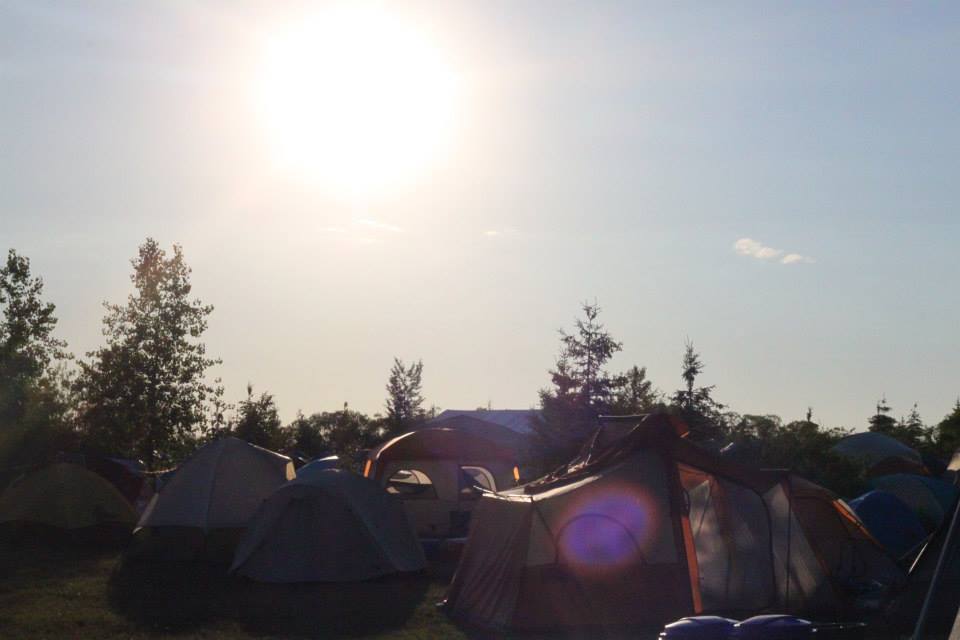Tagged: winnipeg
Why I Marched
- by Alyson Shane
Before I go further, I want to acknowledge that the march I'm discussing was held on Treaty 1 territory.
I mention it because it's important for me to acknowledge that I marched for treatment, rights, and freedoms that many Indigenous people, particularly Indigenous women and girls, still do not receive despite the fact that we marched on their traditional lands.
I also want to preface my post by saying that as a white cisgender female, born in Canada to a middle-class household, with a post-secondary education, I understand and accept my privilege. I do my best to be aware of that privilege and to be respectful and accepting that there are gaps in my perspective, knowledge, and understanding. I want to be clear that my perspective can't (and shouldn't) be representative of, or exclusionary to, others. I also apologize in advance if I unintentionally exclude a specific group from this post - it's not my intention to do so, I am just going to write what I can from the heart in the best and clearest way that I know how.
Without further ado.
Why I marched
I marched because I believe in equal rights. I believe that everyone, regardless of their sexual orientation, gender identity, place of birth, skin colour, mental or physical ability, and religious beliefs should have a place within our society. Everyone has the right to feel safe and respected, and I support a movement which makes equality one of its core principles.
I marched because I stand as an ally behind the LGBTQIA community. I recognize that there are struggles and issues that I can't possibly start to understand due to my privilege as a white cisgender woman, but I stand behind these groups as an ally because I believe that we should be able to love whomever we want, and to have our sexual and gender identities respected and supported by our families, communities, and governments.
I marched because I value our sexual and reproductive rights. I believe that everyone deserves to have access to medically sound, high-quality sexual information and counselling, reproductive care including birth control, and access to safe, legal abortions regardless of their income, sexual and gender identity, race or religious belief. I support helping individuals make well-informed and medically sound decisions about their bodies and sexual and reproductive health.
I marched because I stand as an ally behind minorities and POC. As a white woman I accept that there are struggles that I will simply never face due to my skin colour. With that in mind, I do my best to be an ally to movements like Idle No More and Black Lives Matter. I acknowledge that it is not my place to fight on behalf these groups, but to express my support in the ways which are appropriate.
I marched for our planet. I believe that we have a responsibility to take care of our planet, and to stop putting our convenience and comfort before tackling issues like climate change. We need to end our dependency on fossil fuels and transition to green, renewable energy sources which won't cause further damage the planet and put the future of our species and the rest of the life on this planet at risk.
I marched because I have made mistakes. Opinions grow and change over time, and I know that in the past I have made thoughtless and hurtful comments, and have acted in ways which could have been more kind and well-informed. I am continually doing my best to learn to be an ally, and to learn from my past missteps and do better moving forward.
I marched for my future children. I want to bring children into a world where they don't have to feel ashamed of who they are, what they look like, what their mental or physical capabilities may be, and who they love. I want to be a part of a movement which encourages the best in our society, and which is pushing for a future that I can be proud of.
What can we do now?
Naysayers on the internet and elsewhere have tried to downplay the importance of this movement, saying that it will "die out", "go nowhere" after the initial march has ended, but don't believe them. The cause will only die out if we stop caring about each other and putting in the time and effort to make our voices heard, and that won't happen.
Here are some ways that we can do our part to keep this movement alive:
Acknowledge our privilege
It took me a lot longer than I care to admit to come to terms with my privilege. It's hard and uncomfortable to look critically at yourself and realize the ways in which society treats you differently than other people, but being able to is essential to being an empathetic ally to other groups.
If you aren't sure what any of this means, BuzzFeed has a handy and easy to understand quiz which breaks down some ways in which you may be more privileged than others.
Speak out + listen back
Talk to the people around you about politics and issues that you care about. If you don't feel like you care about any issues, read a few news articles and make a list of the things that you agree and disagree with. Now, google those points and learn as much about them as you can.
Next, ask the people around you what their thoughts are on those topics. Don't be afraid if they're different that yours: instead, look at it as a chance to learn about a different perspective than your own. Ask questions and be curious and respectful, even if you disagree.
Don't be afraid to be wrong, or to admit that you don't know something. Everyone is learning all the time, you and me included.
Get out there
It's easy to be an armchair activist, but until we start getting out from behind our computer screens and showing up to events in our community we can't really begin to understand what other people are thinking and feeling.
Show up to town hall meetings, political debates, free lectures and rallies when you can. It's okay if you don't feel comfortable, and don't know what to say or do. Just showing up and listening is more than a lot of people are willing to do.
If you live in Winnipeg and want a friend to come with you, let me know and I'd be happy to join you.
Did you attend any the Women's March rallies? What were your experiences like? Tweet at me or tell me in the comments, because I'd love to hear from you!
In My Community: Mom's the Word at the Prairie Theatre Exchange
- by Alyson Shane
I'm not going to lie to you: I had some reservations about seeing this play (for those of you that don't know, I've been no-contact (NC) with my parents since February of 2015.)
As a result, the idea of seeing a play about motherhood - something that I have yet to experience, and have thus far only really had negative experiences with - gave me some anxiety. I wasn't sure if I wanted to see the play because I worried that listening to stories of motherhood - of love, of unconditional caring and support - would hurt too much.
However, I also realized that it would be a good opportunity to face a fear (and support the Prairie Theatre Exchange*, which I'm always happy to do), so off we went to check out Mom's the Word.
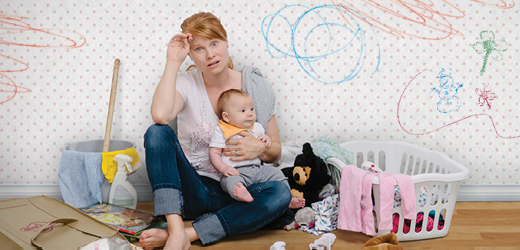
Image via PTE
A play by moms, for moms
Mom's the Word was conceived by a group of actresses and moms living in Victoria, BC in 1995, who all came together to share their stories of the trials and tribulations of motherhood. Together, they pooled their experiences and stories to form a cabaret-style, musical-ish play of sorts which touches on a variety of issues, including: postpartum depression, diapers (and diaper bags), panic, discipline, sex, changing bodies, and much more.
The play opened with a monologue from Jill (played by Yumi Ogawa) about childbirth which was... terrifying, to say the least. I've never had children, but I hope to someday, and seeing such a raw performance of the anxiety, stress, and sheer animalistic power of birthing was a bit unnerving. But, at the same time, it felt oddly inclusive; like this was a trial that every mother goes through, and an experience that is uniquely female.
One of the other mothers, Robin (played by Lisa C. Ravensbergen), gave a hilarious monologue in which she described how she and her equally foul-mouthed partner accidentally taught their child to swear at an early age.
"I tell people he's just saying 'truck' and can't pronounce it properly" she laughs, looking exasperated and embarrassed. This hit home: both John and I include "colourful words" in our everyday vocabulary, and have no shame about it, but the outside perception that we may teach our kids "bad words" too soon in their lives, and be judged for it, is something I've thought about. It felt like such a relief to hear someone addressing it!
Women supporting women
The thing that I loved the most about Mom's the Word, though, was the focus on empowerment through storytelling. Motherhood (from what I can tell) seems like it can be a tremendously isolating experience at times, and it was encouraging to see the moms in the story reaching out and supporting one another.
These struggles were covered really well in the monologues delivered by Jill's character. Over the course of the play she narrates 'letters' to her husband, trying to explain and make sense of the different experiences they're both having (staying at home with the kids vs. maintaining a demanding career) which were, at times, utterly heartbreaking.
"How can I explain what my day was like to you?" she asks "most of my day is spent in silence; how can I put the look our baby and I shared into words?" As John, who came with me, gripped my hand I realized that these were going to be very real issues that I would one day have to face and make sense of, myself.
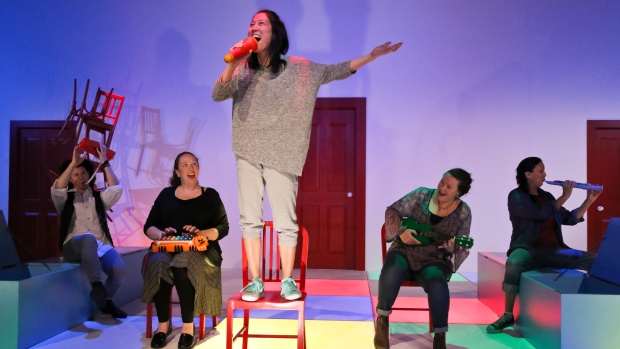 Image via CBC Manitoba
Image via CBC Manitoba
Laughter as medicine
The play wasn't all sad monologues and stressing out about dirty diapers; in fact, Mom's the Word presented the topic of motherhood in unabashed, shameless, hilarity.
In one scene, Alison (played by Trish Cooper) walks onstage jiggling a carrier as she tries to lull her infant (who was born prematurely) to sleep. Her baby falls asleep, but her muscle memory causes her to keep jiggling for several minutes as she addresses the audience. In another, Deborah (played by Jenny Wasko-Paterson) struggles through oral sex (taking bites of a banana onstage) as she says things like:
"I still want you to feel good"
"Oh no, I don't mind. I feel sexy when you feel sexy..." *eye roll*
This monologue is clearly demonstrating the struggles that many moms have with reconciling how tired, worn-out, and unsexy they feel, and the struggle to maintain a sexual relationship with their male counterparts who aren't feeling the same strain. Again, this is an area that worries me as a potential future-mom, and I appreciated that it was addressed and normalized within the context of the play.
The stand out scene for me, however, was one in which Deborah's character took her young son to the local pool. Her interactions with the toddler-age child, the fumbling, the mess, and the hilarious antics which ensued reminded me so much of being a young person, and spending my summers in the daycare my mom ran out of our house, which was always filled with toddlers exhibiting the exact behaviours described in the play.
As someone who doesn't yet have children and has a lot of mom-related baggage, Mom's the Word struck a series of chords that I didn't realize where inside of me. Yes, it was hard to watch some points, but the actors put words to many of the fears and anxieties that I have about motherhood, and presented difficult and stressful scenarios as ones which felt relatable, even to a non-mom like me.
Mom's the Word reassured me that, even if the world of parenting is going to be 'trucking' hard sometimes, at least I'll be able to laugh about it.
----
Mom's the Word is currently playing at PTE until November 27, 2016.
* Disclaimer: I get free tickets to see plays at the PTE in exchange for writing these reviews (it's wonderful)
In My Community: Speaking to Red River College's Creative Communication Students
- by Alyson Shane
Earlier today I had the pleasure of speaking to students in their first year of the Red River College's Creative Communications program (aka #CreComm) about the state of social media, blogging, and the future of digital communication with my longtime internet pal Liz Hover.
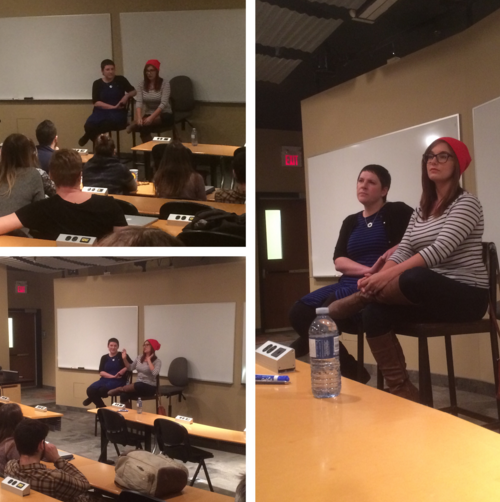
(Really digging my Neil DeGrase Tyson hands in the bottom left, by the way)
This is actually my fifth year returning to speak to students in the program (my first time was in 2011 - how time flies!) and every year it gets better; not just because I get to see new faces and have brand new discussions, but because as my life has changed I've become better suited to be able to speak on these topics, going from a university student, to a university graduate, to being employed full-time and finally to running a business where I literally blog and do social media all day.
As usual, we didn't have enough time to cover everything that I wanted to speak about, so I wanted to cover a few topics that didn't really wrap up during my time with the students today.
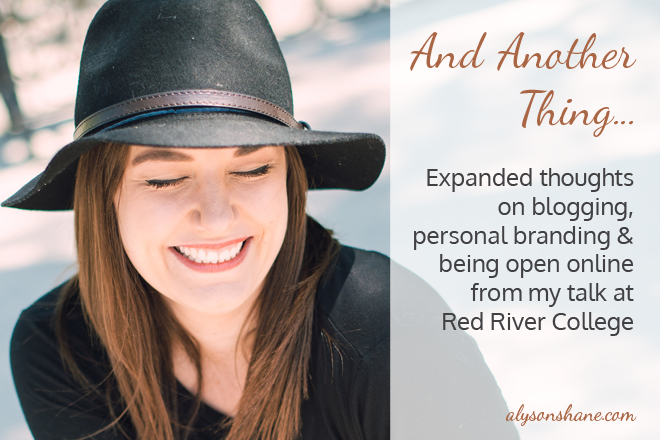
Merging My Personal Brand & Business
I started off as a lifestyle blogger in 2003, back on LiveJournal, and spent a number of years blogging rather aimlessly and not with a lot of purpose. I blogged frequently, sure, but it was usually just about what I'd done on the weekend, or a video I liked, or whatever.
What I had at the time was a strong personal brand, but as I started to think more critically about my craft I wanted to write about my weekends less and less, and about social media, content marketing, and being a business owner more and more.
Blogging for my business gives my blog a sense of purpose, and has provided me with a theme to tie together a lot of topics and ideas which would have seemed weird to write about as a lifestyle blogger.
During our talk Liz turned to me and said "I like your blog now; you seem a lot more happy and positive" and that's because I am. My lifestyle blog chronicled a time in my life where I was largely unhappy and trying to figure myself out, and as I've grown, learned, and gained happiness and confidence as a result of running my business it's translated into what I write here on my blog.
It's totally okay (and normal, and expected) that your blog will change and grow as you do over time - that's okay! We're in a constant state of self-discovery, and our blogs and websites should be a reflection of that.
On Having Anxiety & Being Open About It
One of the things that we touched on in the class, and which several students asked me about afterward, was how I dealt with being an anxious person, and what led me to decide to share some of my personal struggles with my audience when some of them could be potential clients.
I first wrote publicly about my issues with anxiety for Bell Lets Talk Day in 2015. The post is called Living With the Mean Reds and it was one of the most popular posts I've ever written. Since then I've blogged about my progress, which apps I've used to help manage it, and even written about my falling-out with my family, and creating a family of choice to move forward in positive and constructive ways.
None of it is easy to write about, and one of my other family members cautioned me that writing about this side of my life may actually alienate potential employers or clients. My response to that is: if having anxiety or issues with my family stops someone from wanting to work with me, then we wouldn't have been a great fit anyway.
I'm going to do what I want and the kinds of people who respect and appreciate what I have to say will find me and want to work with me. It's worked out great so far.
Besides that, as our digital world becomes less and less private, the onus is on us as individuals to take the time to craft the narratives we want about ourselves online. Sure, you can't control what other people say (remember The Dirty? Omg) but going out of your way to craft your own narrative is an important part of creating your personal brand because even though we like to paint pretty pictures of ourselves online we all know deep down that there are hard times and dark days, and part of being an authentic and relatable human being is being honest with yourself and your audience about your struggles, even if that's challenging sometimes.
What If Blogging Isn't Your Thing?
Creative Communications students have to blog as part of their curriculum, and during our talk we touched on the fact that - let's face it - blogging may not be for everybody. Which I agree with; writing isn't easy for some people.
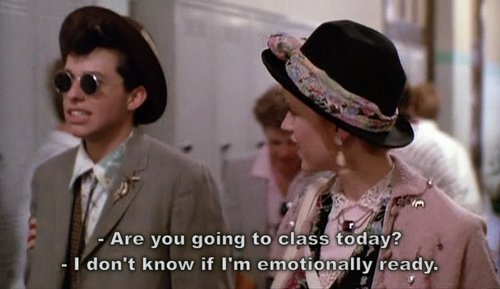
However, I do think that it's important that young people who are entering job markets which require them to be creative (eg: digital marketing, advertising, public relations, etc) should make a point to find a way to express themselves creatively online in a way that they can point to in an interview and say "this is mine."
Blogs also don't have to last forever. My good friend Luke is running year24.com a blog about (you guessed it) his 24th year. This project is on the easy side because he set the parameters himself, and there's a concrete start and end date. What matters is that he made a decision to do something creative and challenging, and was successful in doing so.
But maybe you really hate blogging for yourself, and the idea of holding a camera not attached to your iPhone scares the living daylights out of you. What can you do?
There are a variety of things: start a killer Instagram account about your pet like Liz did; reach out to publications online and start writing for them (one of the very first places I was published online was The Spill Magazine, for example); start interviewing local business owners that you admire and compile them on a website; create and grow a killer Pinterest community; you get the drift.
What matters is that you demonstrate that you're constantly learning, looking for new challenges and opportunities, and can present what you know in a fun and accessible way. The sky is really the limit!
Want More?
Do you have questions about blogging, social media, or how the heck I got to where I am?
Are you a teacher interested in having me visit your class to speak about blogging, social media and digital marketing to your students?
Drop me a line! I'm always happy to have a quick email exchange, a lunchtime chat, or even an after-hours pint at the Yellow Dog. Looking forward to hearing from you!
*As always, thanks to Kenton Larson at Red River College for having me!
In My Community: SPIN (or, I saw the strangest play last night)
- by Alyson Shane
Last night, despite frigid temperatures and hostile winds, John and I trekked out to the Prairie Theatre Exchange to check out the opening night of SPIN, an unusual spoken-word, musical, theatrical oddball of a play featuring a string section, two guitars, a projector, and a bicycle as an instrument.
It was by far the weirdest play I've ever seen, and I totally loved it.
For those of you who don't know me personally, I'm obsessed with riding my bike. I first got into cycling as an adult when the guy I was seeing at the time and I purchased matching his & hers vintage road bikes for $40. They were named Vikki & Vance, and I loved them.
A few years later an unfortunate (car) accident led to me purchasing my current velocipede, Barbara Streisand, whom I now ride all over town the moment the weather allows it. I love cycling; it's an amazingly freeing and fun activity, and there are literally few things that I love more than riding my bike around on a warm day in the sunshine.
So, naturally when I was offered free tickets to see SPIN, a play about cycling, I jumped at the opportunity.
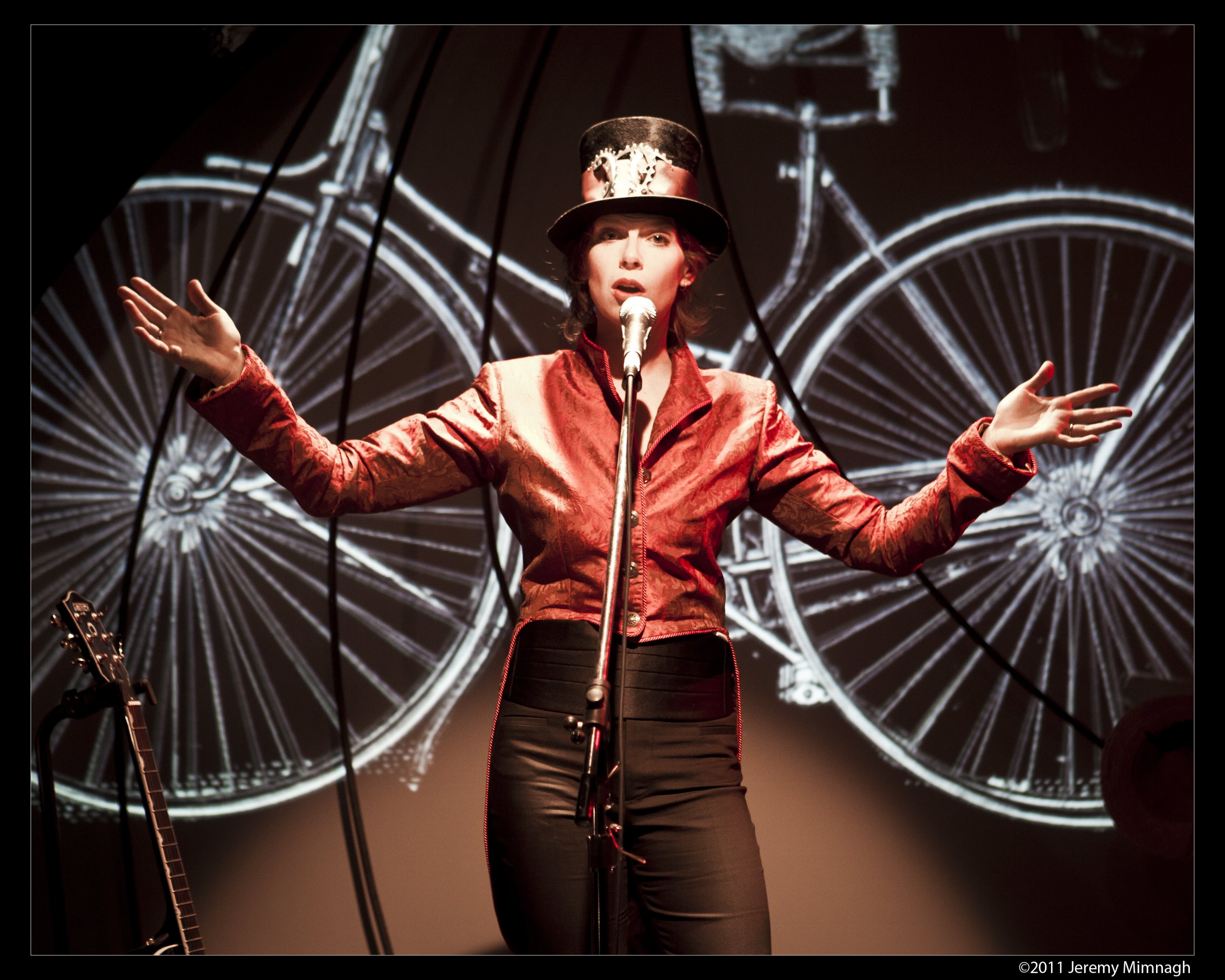
What's so good about a play about the bicycle?
What I didn't know about the bicycle before attending the play was this: the bicycle, in fact, was an important instrument for social change during the women's suffrage movement.
At the opening of the play, which is sort of a mash-up of ballads, catchy songs, and spoken-word pieces, Evalyn Parry emerges and does an impressive recital of Instructions on Learning to Ride a Bicycle, a pamphlet published by Miss Frances Willard, one of the most important suffragettes in history. After learning to ride a bicycle at 51 years old, she was so taken with this efficient mode of self-transportation that she wrote a pamphlet about it, declaring that "all women must all learn to ride, or fall into the sluiceways of oblivion and despair."
Wow. It definitely puts getting on my bike and rollin' around town feel a little less frivolous.
Not only are the stories that Parry weaves together hilarious, fascinating, and inspiring, but her vocals and guitar are backed up by... you guessed it, a bike. Brad Hart, Parry's accompanist who sports a fitting handlebar moustache, literally brings a vintage CCM bicycle to life by playing it like an instrument, suspended on a stand and connected to contact microphones.
The variety of sounds Hart can produce on a bicycle is, to say the least, a little mind-blowing. By using a combination of drum sticks, tuned bells, the spokes, frame, seat, and even the wheels themselves, he adds a unique and fitting element to Parry's songwriting.
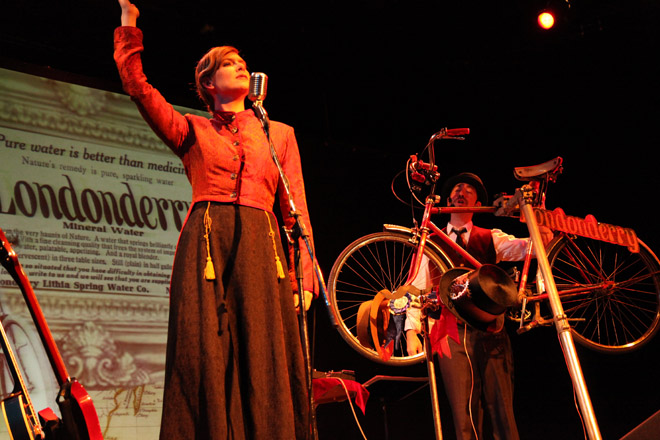
The bicycle as an instrument of social change
SPIN is inspired in part by the amazing true story of Annie Londonderry, the first woman to ride around the world on a bicycle in 1894. Not only was 23 year old Annie Londonderry (not her real last name, Londonderry Lithia was a mineral water manufacturer who sponsored her ride) unusual in that she accepted this unusual challenge, leaving her three kids and husband behind in Boston, but what I found striking (and ingenious) was that she scheduled press events everywhere she went. She sold advertising space all over her clothes and her bike - what a hustler!
This is just one of the examples that Evalyn Parry uses to illustrate how important the bicycle became to women in the late nineteenth century; for the first time ever women had a quick, easy, and most importantly an independent method of getting around.
The bicycle did more than just give ladies a way to get around, however: it also changed the way that we dressed. Using Annie Londonderry as an example of this sartorial shift, Parry paints a hilarious scene of Londonderry riding into a city and blowing people's minds with her masculine attire and her penchant for not giving a damn about it, thank you very much.
"Taking your life into your own hands"
One of the recurring themes throughout the play is the idea that the rider is connected to the bicycle, and that it allows them the freedom to go where they want, whenever they want, on their own terms. Parry weaves the idea of using your heart to move yourself around on your bike, and the idea that the bicycle and all it represents is connected to you as you ride around, beautifully.
"Taking your life into your own hands" also has a double meaning, referring to the suffragette movement and women's rights. As Parry points out throughout the play women's rights are the result of women "taking their lives into their own hands" and not allowing it to be dictated by men, and that the bicycle was one of the first ways in which women were able to start asserting their own independence in stodgy Victorian society.
Two-wheeled words/to wield words
To be honest, when I agreed to see the play I didn't quite know what I was signing up for, but I certainly didn't expect a cabaret-style, spoken-word/musical history lesson on women's rights featuring a bicycle as a backup instrument.
More importantly, however, SPIN made me appreciate what it means to be able to put on my pants and hop on my bike to go do whatever I please. As a woman who gets to enjoy a lifestyle which is a direct result of the hard work of so many women before me, it felt good to have the opportunity to develop a deeper appreciation for something that I already love so much (cycling).
In fact, I was so impressed by the play that it made me want to pull Barbara our, slap some giant winter tires on her, and ride that girl all around town. And in the middle of a frigid Winnipeg winter, that's saying something.
SPIN runs at the Prairie Theatre Exchange until January 31st. Grab your tickets here.
In My Community: Butcher
- by Alyson Shane
The most important stories are the ones which make us uncomfortable. The ones which force us to take a long, hard look at ourselves in the mirror and ask "what would I do? How would I react?" and then grapple with the response.
Butcher, a play by Canadian playwright Nicolas Billon, which is currently showing at the Prairie Theatre Exchange, is an example of modern storytelling which forces that kind of brutal, disturbing introspection.
Full disclosure: I was offered these tickets by the PTE in exchange for writing this article. I want to point that out because I want to be honest with you guys about when I get something for free, and also because I want to point out that what I'm about to say was in no way influenced by their offer. I was blown away by this play, and can't say enough good things about it.
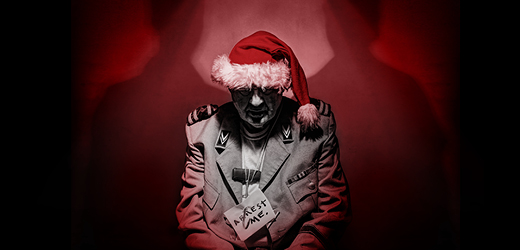
A brief overview
Butcher is a play which starts with an old man who shows up at a police station wearing a military uniform, a Santa hat, and a meat hook draped around his neck. He doesn't speak English, but he's got a lawyer's business card stuck onto the meat hook with the words ARREST ME written on it.
Then, a series of scenes begin to unfold inside a single room between a detective, a translator, the lawyer, and the old man, which explore ideas around justice, vengeance, genocide, and forgiveness.
The play is full of twists and turns, and many times I found myself gripping my seat in anticipation. I don't think a play has ever moved me, or made my heart pound as hard in fear, as Butcher.
What makes it good?
I know I just said I wasn't going to spoil anything, but this one is necessary to actually review the play: the old man turns out to be "the Butcher, " a war criminal who ran a concentration camp during a civil war in the fictional country of Lavinia. The Butcher is wanted by two groups: Interpol, and a group of rebel survivors called The Fjurioji, or the Furies.
Butcher is comprised of a series of conversations about the brutalities of war, the kinds of inhumane things that humans can do to one another, and the cycle of violence that is continually perpetuated by hatred and revenge. It explores these ideas so deeply, and in such a visceral and compelling way that I found myself moved to tears or squirming in my seat on several occasions.
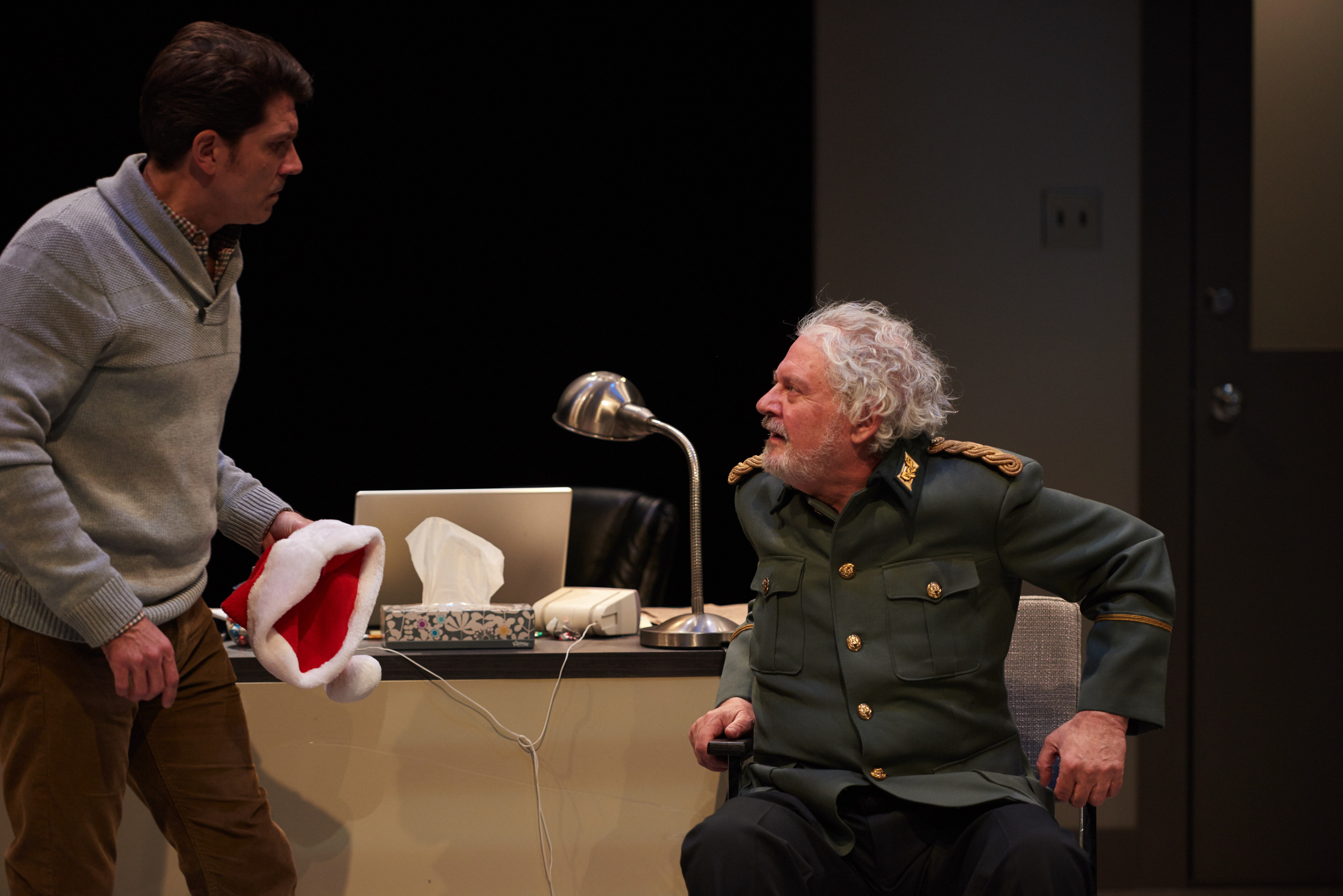
One example is when the old man is forced to confess his worst war crime. Most of what his character says is translated through the other characters, but in this case, as he describes his horrific, brutal actions, the audience can only rely on the reactions of other characters to interpret the severity and brutality of his actions.
This scene, where the audience was left to imagine the atrocities committed by a war criminal, was just one of many where I found myself cringing and feeling uncomfortable. It also served to illustrate how far-removed most Canadians are from the atrocities of war: even when someone is spelling them out for us, we still can't manage to comprehend what those experiences are like. It's like they're speaking another language.
Moving & thought-provoking
Lately it's hard not to feel like the whole world has become engulfed by fear and anger. From the recent Paris attacks, to the deplorable comments being shared across social media about Muslims and the Syrian refugees, it's terrifying to see how easily fear can enter our hearts, and stay there.
Butcher shows us how easily we can become consumed by our lust for revenge, and how even the most innocent among us can become twisted, mutated versions of ourselves when subjected to enough horrors and traumatic experiences. That when we treat others with hatred and fear, those people become permanently damaged or broken by it, and can only turn to more violence and hatred to try and fill the hole that our actions carved in them.
This idea, that the cycle of violence is a self-perpetuating process than can only be halted with deliberate kindness and forgiveness, was a powerful message which, I think, couldn't be more relevant to current global issues. Fear and division are powerful manipulative tools, and we have a responsibility to try and act better than the people who have mistreated us, or acted with hatred in their hearts.
With that in mind, I highly recommend that everyone check out Butcher while they can (it's running at the PTE until December 6, 2015). You won't be disappointed.
**I'd like to thank the Prairie Theatre Exchange once more for providing me with tickets to see this outstanding play. I was moved and humbled by Butcher, and can't recommend it enough.
How to Stay Connected as a Busy Couple (Plus an Exciting Giveaway!)
- by Alyson Shane
When you're in a long-term relationship it can be easy for the magic to fade away. Conversations rife with sparks eventually become lacklustre discussions and you find yourself spending more time less time lookin' fine and more time in that baggy old ugly T-shirt you got from your work several years ago (team building exercise '99!)
Staying connected can be enough of a challenge for most couples, but when you're trying to maintain a healthy, happy relationship while also balancing a crazy professional career, side projects, spending time with friends and family, and all the other good stuff that comes with being a responsible, driven adult, it can seem even more taxing to spend time keeping your relationship kickass.
Since the past few months have been such a whirlwind for both John and I, I figured I'd take a moment on a laid-back (almost) long-weekend Friday afternoon to reflect and share some insight into what's worked for us so far:

Learn Your Love Language
A few weeks ago I was browsing Reddit, and I came across a thread where one of the posters talked about couples' "love languages," and how understanding how both parties in a relationship express their affection is a key component to you both feeling loved.
Here's an example: I like to clean, and one of the ways that I demonstrate my love is by taking care of chores like laundry, dishes and etc which I know John doesn't like doing. I show my love by making his life easier. John, on the other hand, shows his love by telling me every day, singing songs to me and holding my hand, giving me hugs, being silly, etc.
Many people in my situation would just assume that he's lazy, or doesn't care about helping me, but what's actually going on is that I'm basing my expectations for his behaviour on how I behave, not how he behaves. It's important to understand and recognize this distinction.
When we take the time to understand how both parties express their love it makes communicating a million times easier, and nobody feels neglected or put-out by their partner's behaviour.
The test I'm talking about is called The 5 Love Languages and you can take it here.
Practice Active Listening
When the day is over and both your heads are swimming with information from your respective busy days, it can be tempting to want to zone the hell out and not dive into a deep discussion. However, it's important to ask your partner how their day went and actually listen to the words coming out of their mouth.
It can be tempting to nod your head and give the token "yeah, that's good" reply, but (spoiler alert) people can tell when you're placating them, and it's pretty disrespectful to your partner to tune them out while they tell you about what happened that day.
The best way to avoid the classic "mmhmm, that's nice dear" reply is to practice active listening. Active listening is when you listen to someone and then reply by repeating back what you've heard, either by re-stating or paraphrasing what you've heard in your own words.
Not only does this show your partner that you give a shit about what they've said, it also helps clarify the message and meaning, and make sure there's no confusion.
If you're feeling overwhelmed at the end of the day (as I sometimes am) it's totally okay to say "hey, I need some mental downtime, can we chat in a bit?" and then go for a run, or take a bubble bath, or read, or whatever you need to do to de-frag your brain. As long as that communication is there and your partner feels listened to and valued, that's what counts.
Schedule Some Downtime
One of the most difficult things for super-busy couples to manage is getting some freaking downtime. When you're both managing extremely demanding careers, going out to events several times a week, working on side projects, and maintaining a social life, it can be extremely difficult to find time to just hang out.
Admittedly, I really struggle with having "downtime" which doesn't really help. My idea of downtime is usually doing projects around the house, writing, or doing other things that need doing.
Sometimes though, you have to set aside some time and just hang out with each other and enjoy each other's company. This could mean anything: read books together, watch a movie, make dinner, play video games... whatever classifies as "downtime" for you, do that and do it as often as you can.
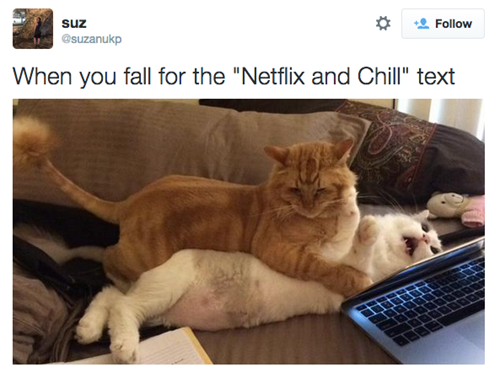
Hook Up (aka "Netflix & Chill")
I don't want to get into too much racy stuff here, but staying physically connected is such a huge part of any romantic relationship, and unfortunately it's one of the first things that seems to evaporate the second couples start to get overwhelmed in other areas of their lives.
I've experienced this personally, and can attest to the fact that when your physical relationship starts to wane, eventually so too does your attraction to your partner, and eventually any romantic interest you may have had goes away as well. At that point you might as well call it quits because you're basically just friends at that point (or roommates, if you live together.)
So the next free evening you have available schedule some time with your partner put on a movie that you've both seen a million times before (you know the one) and "chill."
Plan Dates
When you're busy almost every night of the week it can seem impossible to figure out when to make the time (or the effort, really) to go out for a real, legitimate, you-and-your-significant-other date but it's so, so important.
Courtship is crucial to maintaining all that other good stuff I talked about earlier in this post. Courting isn't just about showing up with flowers (though that helps), it's about putting in the effort, making plans, dressing up and going somewhere spectacular where you have an amazing time together.
We should always strive to be 'dating' our partner, no matter how long we've been with that person.
One of my favourite dates was the day last summer when John and I biked to Assiniboine Park and explored the zoo together. We packed a picnic, a bottle of wine, and the book we were reading together and had a tremendous afternoon.
Do John and I have any dates planned in the near future? I'm glad you asked! Besides going to Gogol Bordello for my birthday (OMG!) we're going to be checking out Mahlerfest, presented by the Winnipeg Symphony Orchestra.
Even better, the good people at the WSO have given me an additional pair to give away to one of my readers!

Here are the deets (via the Winnipeg Symphony Orchestra website)
MAHLER’S 10TH: THE LAST WORD
At the time of his death Mahler had completed two movements of his Tenth Symphony and sketched the remaining movements. A performing version was made by Deryck Cooke: “A masterpiece of reconstruction,” Neville Cardus wrote in The Guardian, “sounding the voice of Mahler and of nobody else.” We are proud to present a WSO premiere, hosted by the eminent writer and Mahler scholar Norman Lebrecht.
This performance also features a Viennese-style masquerade following the performance, which the audience is invited to attend.
Want to win tickets to Mahlerfest? Of course you do!
Here's how you do it: leave a comment and tell me about your favourite date.
It could be anything - maybe you went skiing and sipped hot chocolate together; maybe you went to the library and left Post-Its in all the books you've read; maybe you skipped stones on a pond and made out beneath a huge oak tree. Whatever! I want to hear it!
I'll be choosing a winner by October 26th, which gives you plenty of time to dig through your box of memories as well as make sure your calendar is clear on the 31st.
Good luck!
In My Community: The CEO Sleepout Recap
- by Alyson Shane
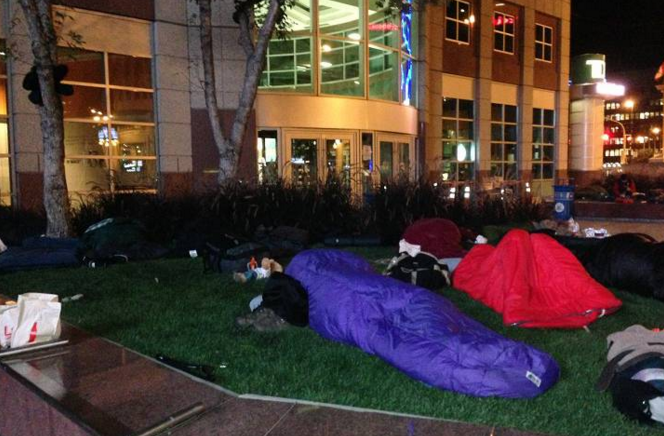
(Image via Global News Winnipeg)
This morning I woke up at 7am in a sleeping bag in a flower bed at Portage and Main.
I spent the night outside as part of The CEO Sleepout, an annual event which aims to raise awareness about Winnipeg's homeless community through fundraising efforts, community outreach, tours, and spending the night outside to gain a deeper understanding of what homelessness is like in our city.
A quick backstory: I'm from a suburb called Riverbend, which is far from our downtown core. I grew up being taught that Aboriginal people -especially the ones experiencing homelessness- were people to be feared and avoided. Since then I've lived in downtown neighbourhoods (Osborne Village, West Broadway and Wolseley, respectively) since my early twenties, but it's taken a very long time to start to start to undo the prejudices and assumptions that I learned around the dinner table.
With that in mind, I expected the CEO Sleepout to be an important event for me, but I didn't fully anticipate how profoundly my evening would affect me, and I'd like to share that with you.
One of the portions of the evening -and, I'd argue, the most important- were the tours through various homeless shelters and rooming facilities where over 500 of Winnipeg's homeless population spend the night.
What I'm about to say is really hard for me to write.
One of the stops on the tours was the Main Street Project, a location which offers emergency shelter and food services, a drug and alcohol detoxification unit, and transitional housing, among other important services. As we passed through the building, I noticed a man standing off in a corner, sweeping a broom and talking to one of the workers.
I recognized this man.
I knew him from all the times he had asked me for money, all the times he got too close to me and made me afraid, and all the times I had deliberately crossed the street away from him because his tall, imposing stature, inability to speak coherently, and dishevelled look frightened me.
For the very first time I saw him as a human being. A real person, instead of a threat.
Typing that, and sharing that statement with all of you is extremely difficult for me to do.
I feel such a deep and profound sense of shame over how I previously felt about him, how I completely disregarded that he has a story, a struggle, and that he's just doing the very best that he can with the limited tools at his disposal.
I had to fight hard to hold back tears as we completed the tour.
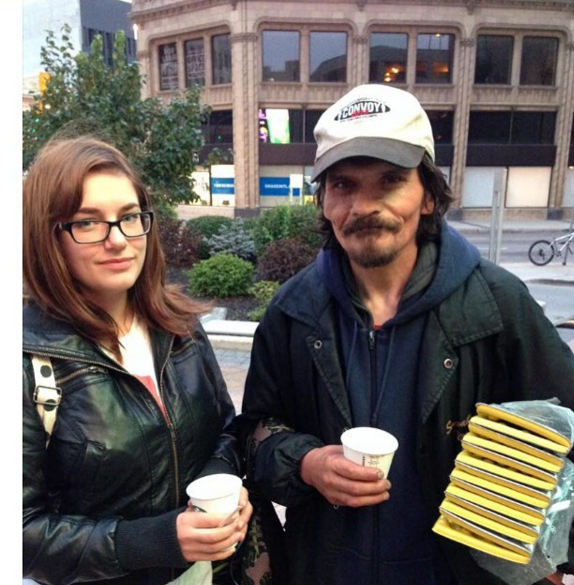
This morning I had the opportunity to talk to Chad (pictured above) who has been homeless for three years. We talked for a while and he told me about how he stopped caring for himself after his wife died, how he's struggled with addiction and low self-worth, and how he's fighting a steep uphill battle to detox and get better. Chad's holding one of the thermal sleeping mats that John and I gave out, and I told him that the next time we see each other on the street, that I'll buy him a coffee and he can tell me about his progress.
He said "I hope I have good news to tell you, but I can't promise anything. There isn't much good news in the homeless community these days."
Chad wasn't the only person experiencing homelessness that I had the opportunity to speak with, but I wanted to share his story, specifically, because it shows how easy is is for us to slip into a downward spiral.
Having the opportunity to connect with people, hear their stories, and learn about their struggles is, in my opinion, where the real value of The CEO Sleepout really lies.
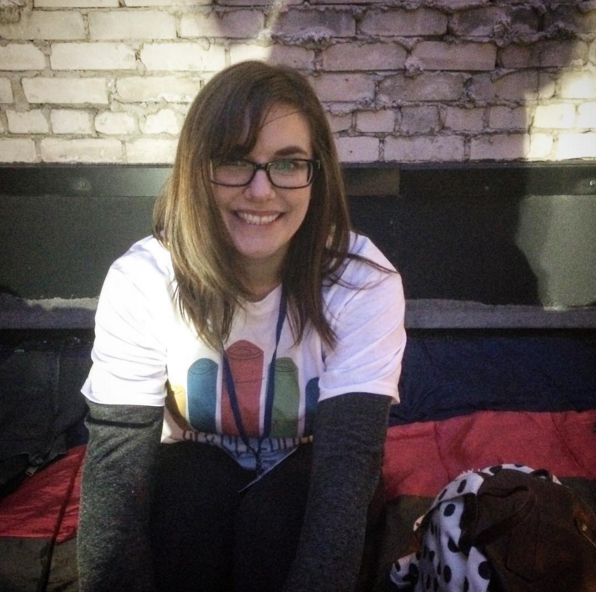
Last night when I posted a the above picture on Instagram someone left the following comment: "Do they have lobster this year? And security to keep away those dreaded homeless. Make them watch your empathy at a safe distance."
That comment has been making me feel sick since last night, because it's indicative of a larger problem within our society. Namely, that taking the time to write a snarky comment disparaging other people's efforts to raise money and awareness about a serious issue is somehow acceptable. That making assumptions about the efforts of others and responding with cynicism instead of participating and making a difference is a suitable course of action to take (it isn't, and it doesn't help anyone, either.)
It's easy to be cynical from the safety of your home, but it takes guts and courage to step up and say "I want to be a part of a solution."
As a small business owner, citizen of Winnipeg, and a resident of one of the poorest federal ridings in the country, I have a responsibility to make my voice heard. I have an obligation to share my stories and experiences, and to take the time to give back to my community and try to make my city a better place for everyone to live.
Sure, the CEO Sleepout isn't perfect, and there isn't a single perfect solution to ending homelessness in our city, but taking time from our days to ask for donations, raise money to help fund jobs and training, tour emergency and shelter facilities, and spend a night on the cold ground to get a glimpse of what it's like to spend a night on the streets is a worthwhile endeavour, and something that I feel everyone -not just people from Winnipeg, and certainly not just CEOs- should do at least once.
You can still donate to the CEO Sleepout, and I encourage you to give whatever you can. Even five dollars will make a difference in someone's life.
If you can't afford to donate, consider giving some of your time to places like Siloam Mission, who are always looking for volunteers (I've volunteered there and can attest that it's a truly rewarding experience.)
Even if you can't do either, thank you for reading this post, and thank you for sharing in this journey with me. I hope to see you out at Portage and Main next year.
In My Community: the CEO Sleepout + why it matters to me
- by Alyson Shane
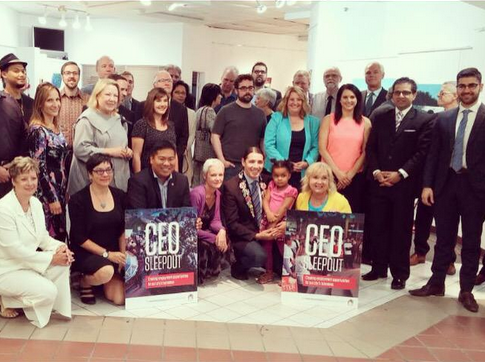
Yesterday I attended the press release for the 5th annual CEO Sleepout, organized by the Downtown Winnipeg BIZ.
The CEO Sleepout, which is in it's fifth year, aims to create employment opportunities for Winnipeg's homeless community, and to create dialogues among over 150 CEOs, community leaders, and media about our role in addressing and eliminating homelessness in our city. In the past four years the Sleepout has raised over $600,000 from the private sector, which has helped employ nearly 137 people experiencing homelessness for more than 51,000 hours of employment - with many of them returning to school or finding permanent full-time work.
On September 24th members of Winnipeg's business community (myself included) will spend a night on the streets at Portage & Main, discussing issues and possible solutions to end homelessness, touring downtown with individuals who have experienced homelessness to hear about their personal stories, and spending a night outside to experience a small taste of what it's like to be homeless in Winnipeg.
I'm really excited to be participating, and helping to raise money and awareness for this amazing cause.
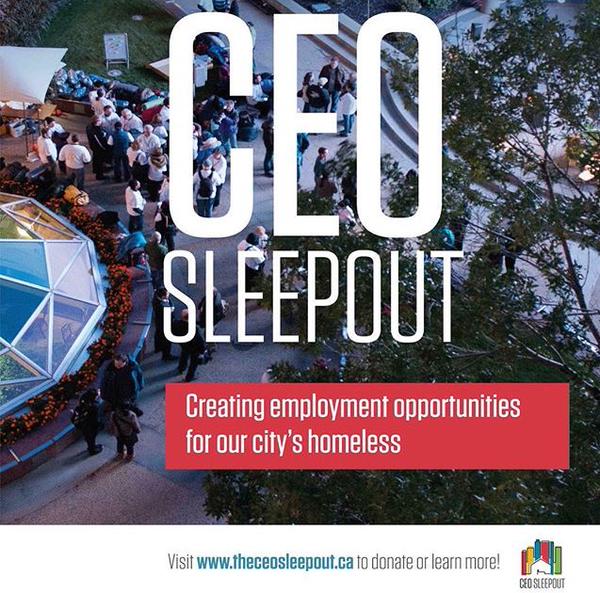
I grew up being quite sheltered. My parents moved me to a suburb called Riverbend when I was a kid, and with downtown a solid 45-minute bus ride away, I didn't spend a lot of time in our downtown core as a young person. I'm pretty embarrassed to admit this, but the first time I spent any time in the Exchange District was at 18, and I spent the entire time gripped with fear that a homeless person would accost me and take all my stuff.
Part of the problem of growing up in a suburb is that you develop a very "us vs them" mentality about your own neighbourhood versus the downtown of your city. In Winnipeg, at least, many of our young people (myself included) grow up holding extremely prejudiced and narrow-minded views about homelessness, Aboriginal issues, and individuals experiencing poverty. We don't see the issues that plague people experiencing poverty and homelessness as something that we need to address because we can simply hop in our cars and drive back to our sprawling suburbs, ignoring the problem completely.
I'm fortunate that I grew out of this phase in my thinking. When I moved out of Riverbend I lived in Osborne Village for a year, and then to West Broadway in order to be closer to school (I attended the University of Winnipeg, where the entire campus is located downtown.) West Broadway is one of the poorest neighbourhoods in the country, and living in a mixed-use and mixed-income neighbourhood, and attending a school like the University of Winnipeg which encouraged discussion about the specific challenges that Winnipeg faces in terms of public discourse and action to combat homelessness, was an eye-opening experience.
I started to see Winnipeg, and the people in it, as my responsibility. Living downtown and getting involved gave me a sense of community that I'd never felt while living in Riverbend; suddenly I wanted to see my city thrive and succeed because it meant that everyone -not just me- would get to benefit from it's success. A rising tide lifts all boats, as the old saying goes.
I was lucky: I experienced a specific set of circumstances which allowed me to develop beyond the close-minded views I had been raised with. However, many people in Winnipeg (and elsewhere) still consider homelessness and other socio-economic issues to be something that simply "isn't their problem."
That's why I decided to get involved with the CEO Sleepout. I want to raise awareness about an issue that concerns all of us, whether we live in Riverbend, Wolseley, St. Boniface or Transcona. Everyone in Winnipeg has a responsibility to do our best to make our city a better place to live - for ourselves, our kids, and for everyone else who calls Winnipeg 'home.'
I'll be collecting donations until the day of the event, so please give generously and consider donating your time to help out at local shelters and resource centres like Siloam Mission and RaY: Resource Assistance for Youth.
Ending homelessness won't be an easy task, but by working together and raising awareness we can start to make real change in our city. Let's do it together.
Winnipeg Folk Fest: My Favourite Temporary Community
- by Alyson Shane
Hello everyone!
It's been a while, hasn't it? I've been away for the past week or so at the Winnipeg Folk Festival and I'm just getting back into the swing of things today.
For those of you non-festival-goers and non-Winnipeg locals, the Winnipeg Folk Festival is a massive four-day music festival which takes place in Birds Hill Park, one of our beautiful provincial parks. Some people just go for the day, but many of us (myself included) make the trek 45 minutes outside the city to be able to camp in their massive, sprawling campground.
Going to Folk Fest feels like coming home. Every year as I haul my camping gear up the trailhead and see the wide expanse of the festival, with it's multitude of tents, signs, posters, bikes, and decorations my heart starts to flutter and I feel so at peace.
It got me thinking about the beauty of temporary communities.
In university I read a fascinating paper called "In Search of How Societies Work: Tribes - The First and Forever Form" by David Ronfeldt that has always stuck with me. It was one of the first papers that I'd read which got me thinking about how, even in our digital age, we still network and search for "tribes" online that we can connect with: we find Facebook groups, join Twitter chats, and customize our subreddits to help us find communities that we can connect with and which give us a sense of belonging.
As a content marketer, communities are my game. I nerd out about community-building and people coming together to share positive stories and experiences online on a daily basis, and being able to apply that same sense of wonder and excitement to a going camping for a few days is a truly unique experience.
From the moment I set foot in the campground, I feel like I'm among friends; my own kind, who are all there to enjoy the summer, the music, the campground festivities and activities, and each other. We're all friendly, respectful and kind to one another; it's not uncommon to wander by a campsite and join in for a few songs, or make friends while waiting in line for some wood-fired pizza at the food vendors, or simply to wave and say 'hi' to someone whose costume makes you smile.
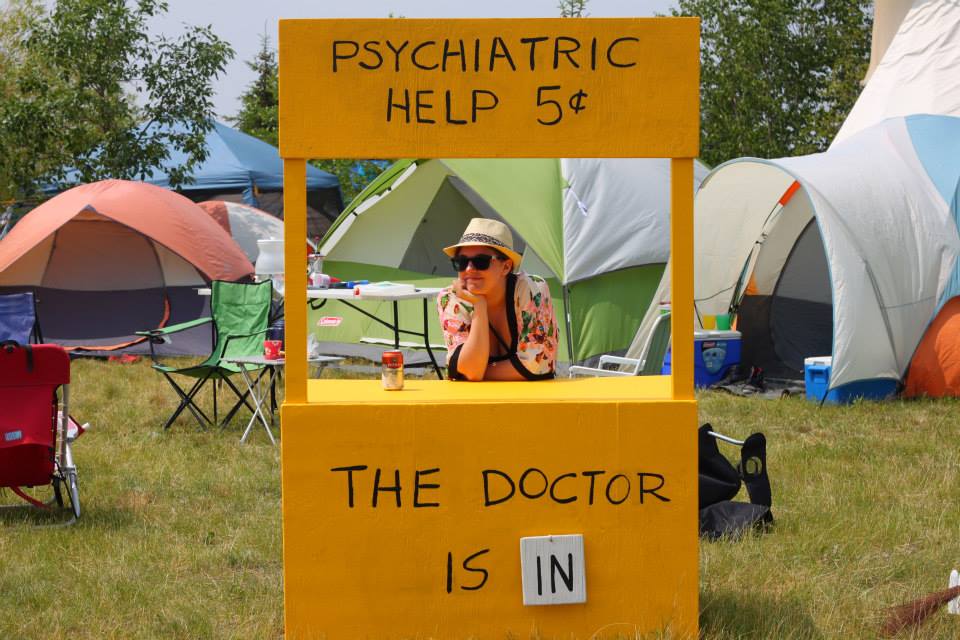
I'm part of another community at Folk Fest as well: the volunteer crew. Every year over 3,000 volunteers handle everything from security, to environmental clean-up, traffic, first aid, making and distributing food... you name it, there's likely a volunteer to handle it. We spend time training together, getting to know one another, and sharing in the long nights and blazing hot days of our shifts. We make friends with our crew members and the campers are so incredibly kind to us when we're on our shifts; it's not unusual for a random camper to shout out "you guys are doing a great job!" to us as we walk around the campground making sure everyone is having a safe and positive festival experience.
I've been to a handful of festivals in my lifetime but none of them have the same sense of shared respect and camaraderie that I feel at Folk Fest.
The anticipation of going makes me part of another community, as well: many people (myself included) see the festival as one of the highlights of our year, especially here in Winnipeg where our climate can be extremely harsh. Our winter temperatures can plummet to below -40 celsius and stay that way for weeks on end, and our summers can soar to over +40 celsius as well.
We truly experience the full range of seasons here, and many a long winter night is spent daydreaming about warm temperatures and, for many of us, the experience of camping at Folk Fest. I'm not kidding when I say that people live to go camping at this festival and take part in the temporary community that exists for a few short days each year:
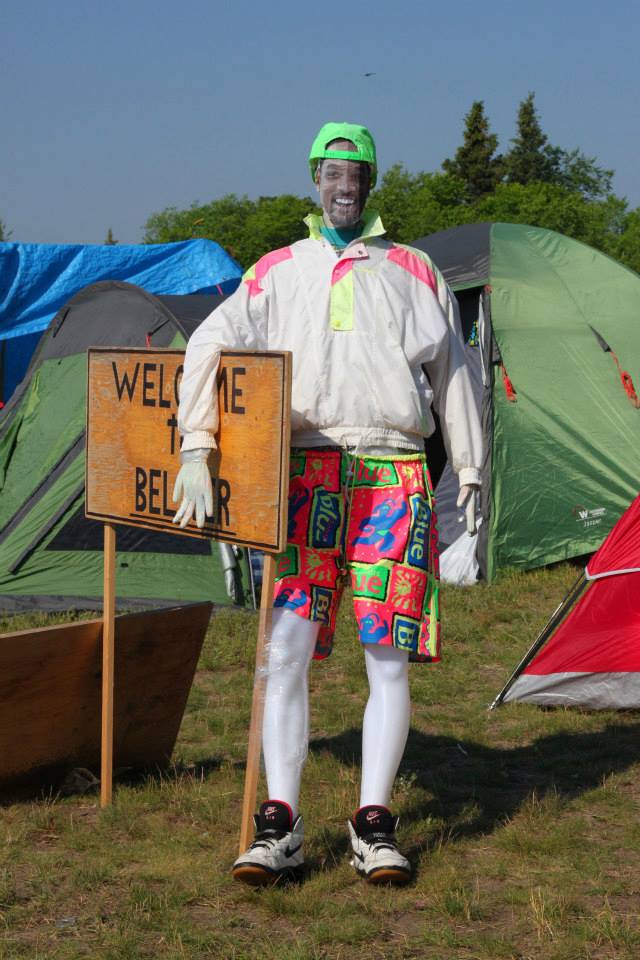
People haul in all sorts of weird stuff and set up the weirdest camps, from a temporary tattoo parlour which will create custom designs for you, a Jurassic Park themed camp with huge dinosaurs and torches, a Peanuts themed camp complete with Lucy's psychiatric help booth, to freakin' Bel-Air with a Fresh Prince mannequin, people really do go all-out in order to contribute to this magnificent, temporary community. The sheer amount of effort and love that they put into making the campground experience a unique and positive one for everybody is truly inspiring.
In addition to all the amazing communities that I get to help build and watch grow as part of my work, my day-to-day activities online, and this blog (thank you for reading, as always!), being able to be a part of the multitude of communities at Folk Fest always leaves me feeling so inspired and, of course, dreaming up ways that I can contribute next year!
Do you have any favourite communities (online or offline?) If so, I'd love to hear about them!
Supporting My Community: MBCouldBe and Pride 2015
- by Alyson Shane
Somehow on a random Wednesday I found myself wide awake at 5am. As I was lying in bed cuddling Toulouse and listening to John snore softly (it's adorable, seriously) I started thinking about community, how important it is to make the time to make your values known, and to support causes that you believe in.
This past weekend I volunteered at #MBCouldBe, a policy summit put on by Manitoba Forward. I volunteered with John and Luke Jacob, and we spent the day listening to various speakers and panel discussions and tweeting from the Manitoba Forward twitter account (as well as our own, of course).
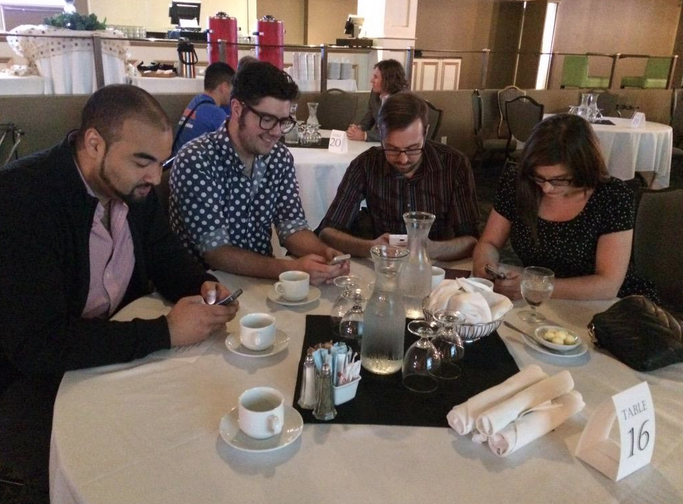
(All of us setting up for a busy day of Tweeting.)
When I arrived I wasn't sure to expect; what sorts of people would be there? What would their views be? Was I just walking into a giant, one-sided political discussion?
What I found surprised me: I met a diverse group of individuals and speakers who were all interested in actively discussing ("actively" is putting it lightly in some cases) the ways in which Manitoba could work towards being a more successful and vibrant province. I was impressed at the variety of speakers at the event: some were obviously very centre-right, some much more liberal in their views, and the discussion that took place was positive and informative.
What impressed me the most, though, was the sheer amount of people that came out on a warm June afternoon on a Saturday, while events like Jazz Fest were going on and patios were abound, to sit in an event centre and discuss Manitoba's future.
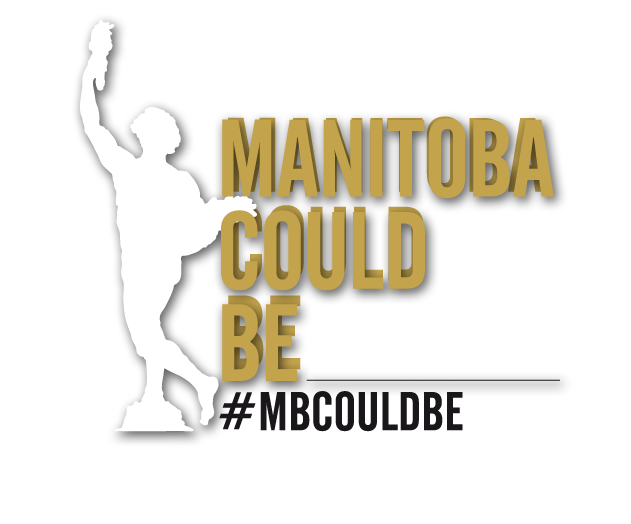
This was important to me for several reasons, the largest of which is that as a Manitoban I was raised with a very healthy sense of self-deprecation, which I've written about before. Manitobans can be snarky and we can be cynical, especially about our own hometown and our province. We're raised with the belief that Winnipeg, and Manitoba on a larger scale, simply isn't worth the energy. Why put time into improving our local economy or starting a small business here when we can just run off to Toronto, Montreal, or Vancouver?
I used to have that mindset. Not so long ago I was dead-set on moving to Toronto, where I have some family. I was going to leave Winnipeg in my dust and make it big in Ontario. Then something changed: I took a class at the University of Winnipeg called (appropriately enough) "The History of Winnipeg" which completely changed my views.
When I started spending time getting to know the complexities of the city and the province where I grew up, I started to develop a deeper understanding of why our issues were unique, and for the rich, beautiful history we have here and the strong, creative, interesting people decide to spend their lives here. I fell head-over-heels with Winnipeg, and decided that I wanted to stay and invest my time, my business and my life to helping make it a better place.
Many Manitobans still have that negative mindset, unfortunately, but among the people that I spoke to and who participated at #MBCouldBe I didn't hear a single dissenting voice. Instead I heard a ton of local pride, and even when we discussed ways in which we could be better, it was always with hope and with a fierce sense of dedication to making Manitoba an even better place to work and to live.
--
Another way I experienced local pride this weekend was the following day, when I marched in the 2015 Pride Parade. New Media Manitoba sponsored a banner in the Pride Parade and I tweeted about it and marched with my friends in support of the LGBT community.
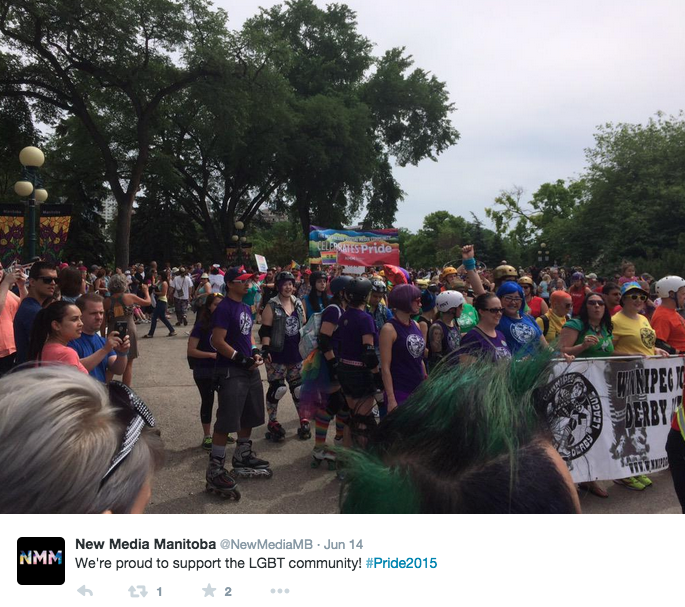
There were over a thousand people who showed up in costume and with banners and floats, and the outpouring of love and support for the LGBT community is what makes Pride one of my favourite annual events - I've been going since I was allowed to start taking the bus downtown from the suburbs where I grew up.
Someone once said to me "we march in the Pride Parade so that one day we don't need one." As in, by raising awareness and support got the LGBT community with the parade, eventually they hope that society will become accepting of those individuals to the point where a parade is no longer necessary. The whole point of the annual Pride week is to mobilize support for the LGBT community and to show people that there are people who support the rights and freedoms of others to express themselves and to be who they are, regardless of what (if any) gender they identify with.
--
This morning, while watching the dawn creep into my bedroom it struck me that half of showing your support is simply showing up. It's very easy to play Armchair Activist (and we all do, to some extent) but by taking the time out of our daily lives to physically show up and show support for our local communities -be they political, social, sexual, whatever- we help make the world a better place because we add our voices and our bodies to causes that matter to us.
I spent my past weekend, almost in it's entirety, lending my time and my energy to causes that I believe in and it felt amazing. It was a terrific reminder that, really, all we need to do to start making our communities a better place is show up and get involved.
Have you attended any local events in your community lately? What were they for? I'd love to hear about them!

